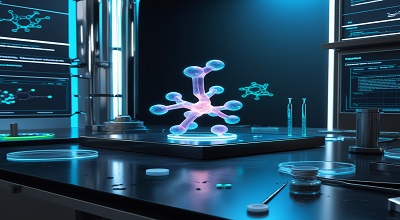AI Drug Discovery
AI drug discovery leverages artificial intelligence to accelerate and optimize the process of finding new medications. By analyzing vast datasets, AI can predict drug efficacy, toxicity, and optimal chemical structures faster than traditional methods.
The Role of Generative Chemistry
Generative chemistry uses AI models to design novel molecular structures with desired properties, drastically reducing the time and cost of drug development.
Why AI is Revolutionizing Pharma
- Speed: Cuts drug discovery from years to months.
- Cost-Efficiency: Reduces R&D expenses by billions.
- Precision: Improves success rates in clinical trials.
How Generative AI is Transforming Drug Development?
Traditional vs. AI-Driven Drug Discovery
| Aspect | Traditional Methods | AI-Driven Approach |
|---|---|---|
| Timeframe | 5-10 years | 1-3 years |
| Cost | $2-3 billion per drug | <$1 billion |
| Success Rate | ~10% | ~30-50% (predicted) |
Key Technologies Powering Generative Chemistry
- Machine Learning (ML): Identifies patterns in biological data.
- Deep Learning: Predicts molecular behavior.
- Reinforcement Learning: Optimizes drug candidates iteratively.
Latest Advancements in AI Drug Discovery (2024-2025)
Breakthrough AI-Generated Drugs in Clinical Trials
- Insilico Medicine’s INS018_055 (AI-designed anti-fibrotic drug in Phase II)
- Exscientia’s DSP-1181 (AI-created OCD treatment)
Case Studies: Successful AI-Developed Therapeutics
- Atomwise’s AI-Powered Ebola Treatment
- BenevolentAI’s Baricitinib for COVID-19
Big Pharma & AI Startups Collaboration Trends
- Pfizer + CytoReason (AI for immunology)
- GSK + Exscientia (AI for oncology drugs)
Generative Chemistry: How AI Designs New Drugs
Molecular Generation with GANs
Generative Adversarial Networks (GANs) create and refine molecular structures, ensuring drug-like properties.
Reinforcement Learning for Optimizing Drug Properties
AI models iteratively improve drug candidates based on feedback (e.g., solubility, toxicity).
Predicting Drug-Target Interactions with AI
Deep learning models simulate how drugs bind to proteins, improving efficacy predictions.
Challenges & Ethical Considerations
Data Privacy & Bias in AI Models
- Need for diverse datasets to avoid biased predictions.
- Secure handling of patient genomic data.
Regulatory Hurdles for AI-Generated Drugs
- FDA & EMA adapting guidelines for AI-based drug approvals.
The Future of AI in Pharma: Risks & Rewards
- Risks: Over-reliance on AI, job displacement.
- Rewards: Faster cures, lower costs.
Top AI Drug Discovery Companies Leading the Way
| Company | Focus Area | Notable Achievement |
|---|---|---|
| Insilico Medicine | Anti-aging, oncology | First AI-generated drug in trials |
| BenevolentAI | Neurology, rare diseases | Repurposed baricitinib for COVID-19 |
| Atomwise | Small-molecule discovery | AI-predicted Ebola drug candidates |
The Future of AI in Drug Development
AI-Powered Personalized Medicine
- Tailoring drugs based on genetic profiles.
Fully Autonomous Drug Discovery Labs
- AI robots conducting experiments without human intervention.
The Economic Impact of AI on Pharma
- Potential to save $70 billion annually in R&D.
Conclusion: The Next Era of Medicine
AI-driven drugs discovery is no longer a futuristic concept—it’s here, accelerating treatments for diseases once deemed incurable.
Key Takeaways
✔ AI reduces drugs discovery time by 70%.
✔ Generative chemistry enables novel drug designs.
✔ Big Pharma is investing billions in AI partnerships.
How to Stay Updated on AI Drug Discovery?
- Follow ZoomDoors.com for the latest AI-pharma breakthroughs.
FAQs on AI Drug Discovery & Generative Chemistry
1. How accurate is AI in predicting new drugs?
AI models now achieve >80% accuracy in early-stage drug predictions.
2. Can AI replace human chemists?
No, but it enhances their work by automating repetitive tasks.
3. Are AI-generated drugs safe?
They undergo rigorous testing like traditional drugs, but regulatory frameworks are evolving.
4. Which diseases is AI most effective against?
Cancer, rare diseases, and infectious diseases (like COVID-19).
5. How much does AI reduce drug discovery costs?
Estimates suggest up to 50-70% cost reduction.
Final Thoughts:
AI in drug discovery is reshaping medicine, offering hope for faster, cheaper, and more effective treatments. Stay tuned to ZoomDoors.com for cutting-edge updates!
More Here: Fabledom Game

